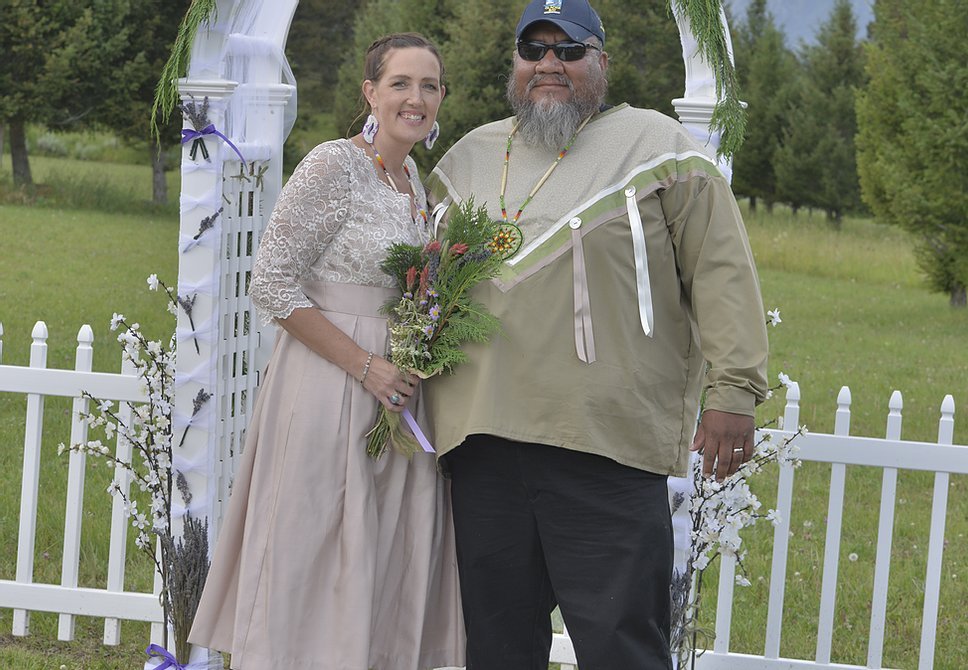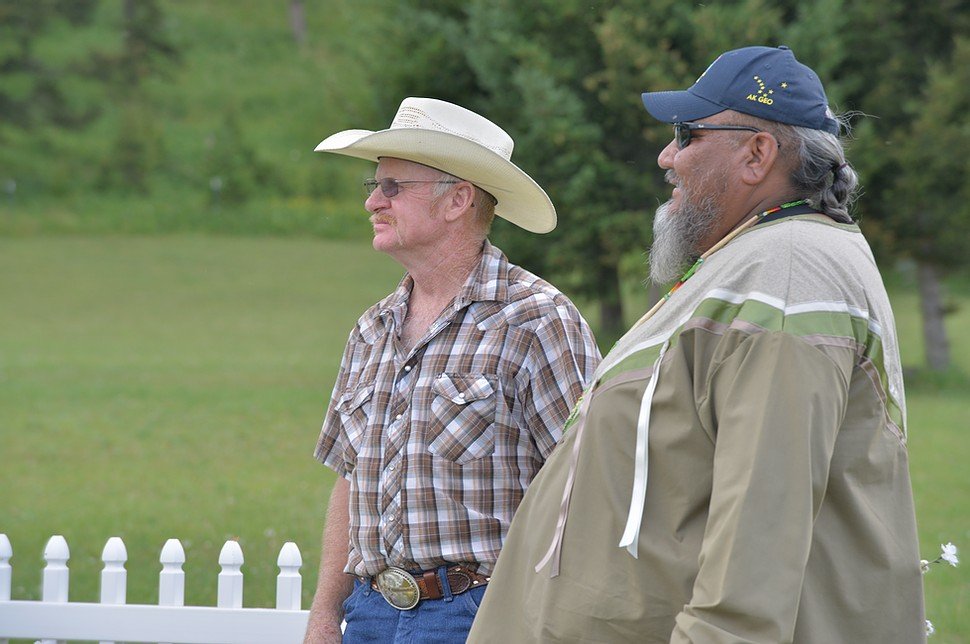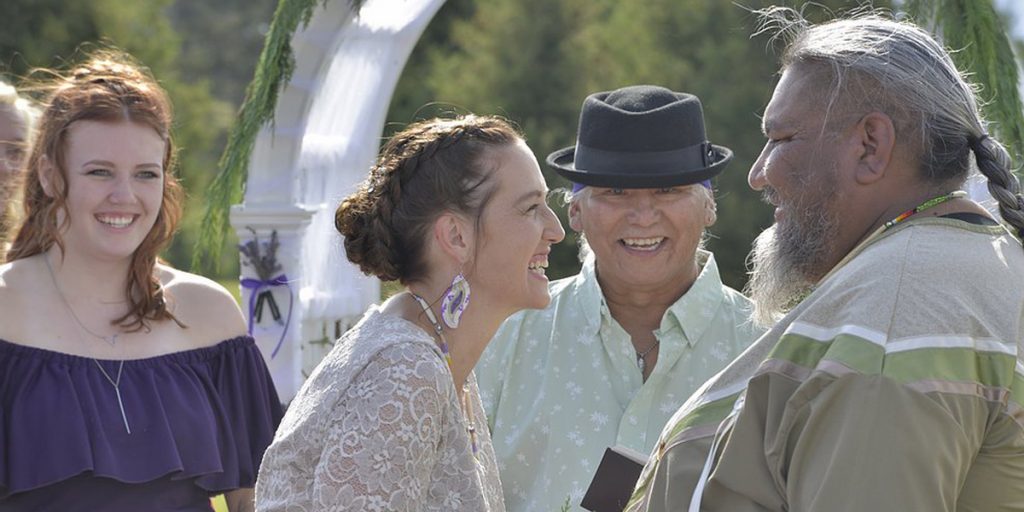Non Western depicts a contemporary American fairy-tale where native and non-native values and cultural identities intermix to a terrifying degree.
‘This is our fairy-tale’, says Nanci Red Neck right at the end of Non Western, except that it isn’t. Non Western possibly depicts the least fairy tale like narrative I have seen in quite a while, but that does not mean it is not as inquisitive of love and relationships as its counterparts. Director Laura Plancarte manages to explore identity, relationships and traditions in a way like no other, taking close-ups to the literal, she dives deeper into the history and reasonings behind who are characters are and need to become. Non Western is an all-round American love-story where traditions and cultural values take the upper-hand in conservative society and women have to make the tough choices to find a sense of belonging. It is so much more than a documentary on native and non-native cultural behaviour, it is the quest of needing somewhere to belong.
The documentary follows the lives of Nanci and Thaddeus as they are planning their wedding. However different they might seem, they are connected through their unique pasts. Nanci was born in a Christian family and, after experiencing domestic abuse and homelessness, was ultimately adopted into the Lakota tribe at the age of thirteen with her mother. Thaddeus, on the other hand, was born in the Cheyenne tribe and, because of its harsh way of living, left the tribe at the age of sixteen to live as a foster-child with a Christian family. Though their experiences have been similar, what forms the basis of their identity is not.
Nanci is a self-proclaimed ‘modern woman’ with a doctorate in child literature, teaching at universities and conferences all over the country. Thaddeus dived back into his Cheyenne conservatist traditions and cultural values when it comes to family life, proclaiming things like ‘when you’re home, you are a wife first.’ Navigating between these confronting ideas of a woman’s role, Non-Western shows us that sometimes assuming an identity (in this case, becoming Cheyenne) can provide a much-needed sense of belonging while faced with the hard choice of forsaken your previous life (and identity).

I have to admit, when I first watched Non Western I experienced some furious teeth grinding and was deeply disturbed but the style of photography. However, this is a documentary best viewed with a bit of distance and rational thinking. The closer Plancarte gets to her characters, the more time you should allow for her documentary to really sink in. If not, you risk judging the film too harshly (like I did in the beginning) and subsequently miss out on the nuances of the characters and their stories. If anything, go into this film knowing nothing of the premise, as you will likely start forming an opinion on the matter even before the main characters can have their say. With a subject as interesting and thought-provoking as gender and identity issues, it would certainly be a shame.
Non Western is more than an empathetic observational documentary about the complexities of identity between native and non-native and what upbringing and birth means in it all. It goes beyond the stereotypes of conservative man and modern woman, even-though these are explicitly dealt with in the narrative of the film, and makes you think of what lies beyond these two seemingly non-aligned figures. The film’s strength lies in the elements that are unspoken, yet visually enlarged. The way Nanci’s face despairs when her fiancé’s mother condemns her ‘modern woman’ lifestyle as a university professor and PhD doctorate who is well-known in her field. The way the camera zooms in on Thaddeus’ native facial features, following him to intimate moments such as the shower while he otherwise shuns the expression of his emotions. It can be seen as exemplary of how outward expression forms part of our identity, which is always pieced together of snapshots.
Plancarte’s third feature highlights its closeness to its subjects, their conflicts, and their traumatic past that result in a tense and real portrayal of character and contemporary American life. The weight of ancestors and tradition lies heavily throughout the film and is ultimately personified in Thaddeus’ and Nanci’s diverse backgrounds and upbringing. The visually spare film only functions to highlights this element of the film. Interspersed with their close-ups, Plancarte has put odd images of animals in distress, amplified by a sound design that implies tension – but is there tension to be found? The slow-motion close-ups, combined with the use of soft focus around the edges of the frame, give the film an uncomfortable closeness that is closer to a thriller in terms of suspense than what Plancarte possibly wanted to depict. A sense of uncomfortable awkwardness is clear from the start of the film, complete with the glooming and brooding that comes with unagreed-upon house parties.

Though the visuals of Non Western are well put together, there are some sides to the narrative that are unbelievable or underemphasized. For example, Nanci’s side of the story in comparison to Thaddeus’ lacks in depth. True to the topic the film discusses, she is stonewalled by the macho patriarchal culture of the Cheyenne. There is significantly more screen time and background story given to Thaddeus, to the extent that it appears the documentary is about his part in the relationship. The absence of dramatic fights, the lack of Thaddeus’ enthusiasm for his wife-to-be and the family leave, together with passive aggressive communication gives the documentary a foreboding sense of failure that cannot be explained through just the exploration of past trauma. There are also several moments where key elements in the film give the impression of being overtly staged or even dubbed over. The question of what is reality and what is staged results in a dissociative experience that turns the documentary in an unbelievable work of fiction – there are, after all, certainly some things being said that cannot possible be true in this day in age.
Overall, Non Western is an interesting case study into what personal identity in relationships can mean and how it can alter because of the relationship. Plancarte does a great job in the visual imagery of the tense and foreboding nature of giving up parts of your identity to fit in with someone else’s ideas and cultural identity. That being said, the narrative itself does not give enough space equally to both its main characters to call this exploration of how they relate to each other fair. The documentary’s narrative is at times unbelievable and seems too out of touch to be a modern depiction of intercultural relationships, though a fair understanding of native culture in America and its cultural standings might make this documentary by far more believable and interesting. It is more ‘Cowboys and Indians’, as Ben Rogers, the country singer, ironically sings throughout the film.
Non Western will be screened digitally at the Raindance Film Festival from 28 October till 7 November, 2020.

